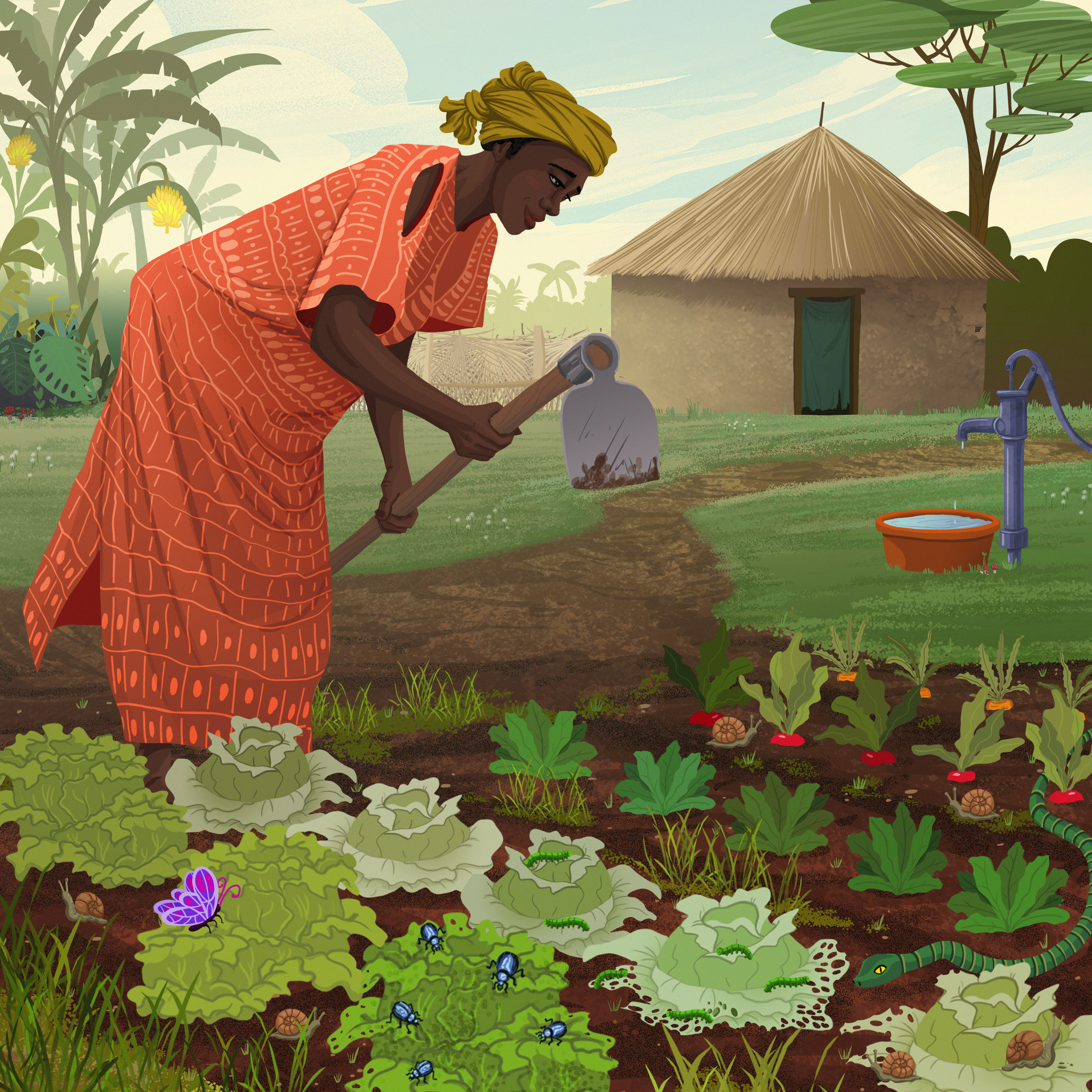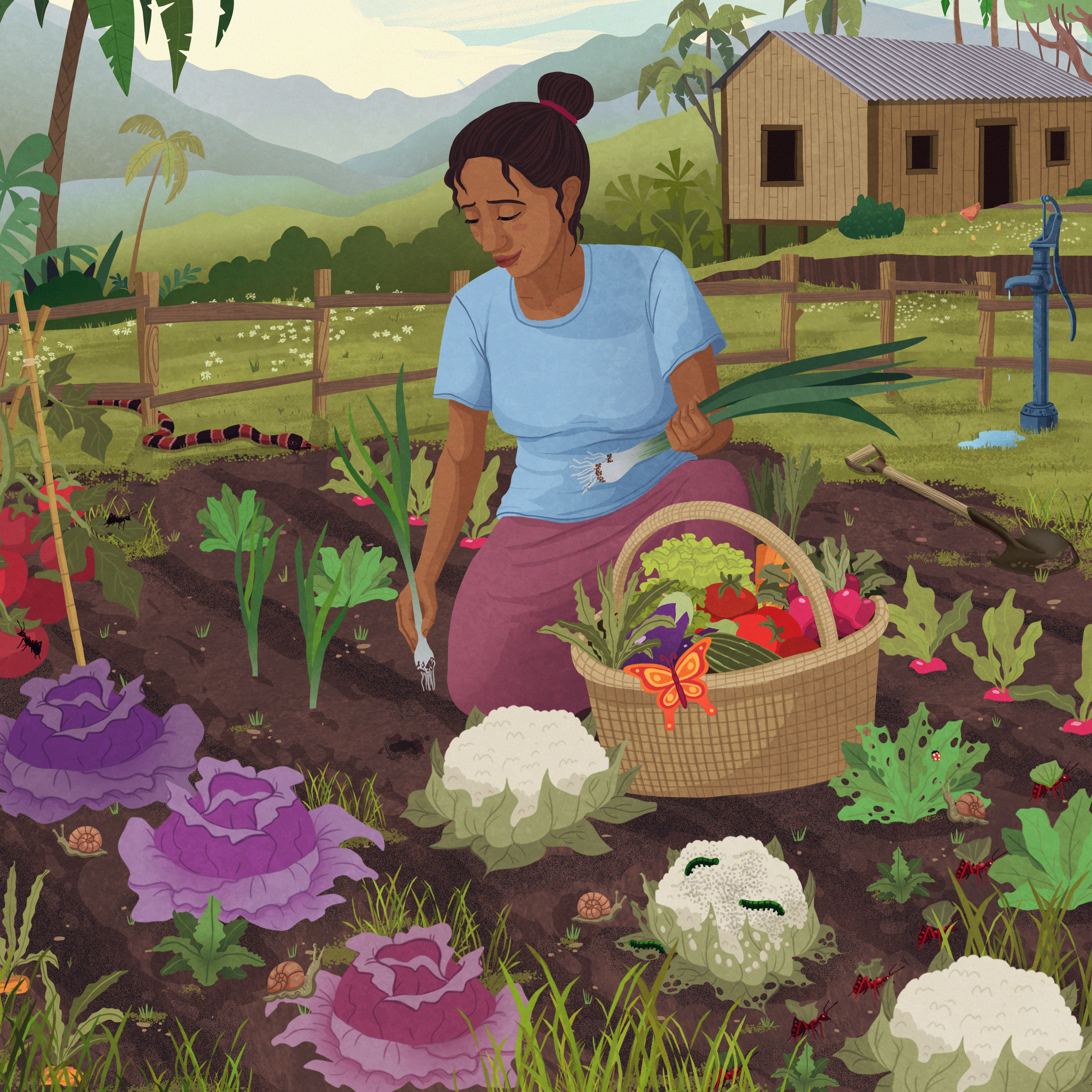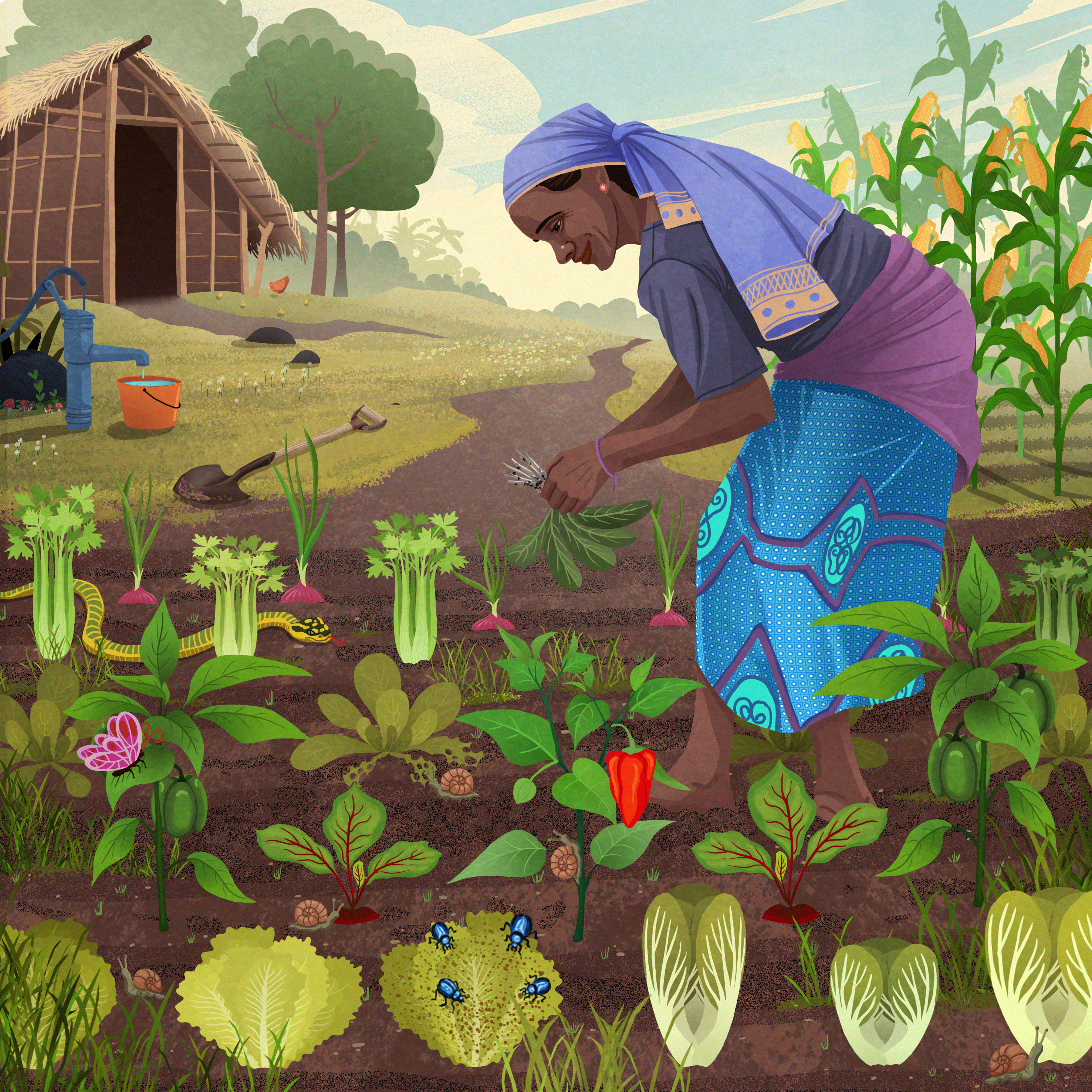Global Child Protection Parenting Curriculum
Year 1, Lesson 5: A Healed Garden - Exposure to Light
Time Needed: 45 minutes
Garden Images:



Index
Teacher Preparation
Introduction
New Ideas
Story
Caregiver Connection
Application/Activity
Reflection
Closing
Resources
Teacher Preparation
Objectives
The caregiver will be able to:
- Hear a Bible story about how exposing evil done to us and through us brings healing.
- Explore how to respond in love to a child’s exposure of wrongs done to them (compassion, good listening, valuing the child’s whole person [heart, mind, body] as most important, firm commitment to protecting child in the future regardless of implications, messages of worth and “it is not your fault”, etc.)
- Explain why exposing evil is necessary for healing.
- List reasons that parents often find it difficult to respond in love to a child’s exposure of wrongs done to them (community resistance, impact on family, commitments to respectability, modesty and avoiding public shame over a child’s worth and safety, economic motivations, intention to put a child through a “rite of passage” so that they suffer as the adult did).
- Explore how a parent’s inner thoughts, feelings, personal experiences will directly affect how they respond to a child’s admission of abuse.
- List trustworthy resources in the community to provide support and help (include 1-2 sentences on how to recognize trustworthy sources).
Materials
- Notebook
- Chalkboard and chalk
- Garden image
Preparation
- Read the lesson and reflect on how to teach it wisely.
- Skim previous lesson. Prepare to have a quick review at the beginning of class.
- Think of a time in your life when something good came from a painful or challenging experience. Have your story ready to help the discussion as you begin the New Ideas section.
- Create a list of specific Compassion and community resources available to parents to help support them if a child shares physical or sexual abuse.
Introduction
5 minutes
![]()
In our last meeting, we discussed how painful experiences such as abuse naturally lead us to want to hide and keep them secret. When children experience abuse, not only does an abuser ask them to keep it secret, adults around them often also desire to keep such situations secret.
But what happens to a person when hurtful experiences are kept secret? Let’s explore this question.
Hold up the curriculum’s garden picture for the participants to see.
- What are the healthy parts of this garden? Accept all answers.
- What possible dangers do you see in the garden? The insects and perhaps the snake.
- What will happen to the garden if a farmer fails to notice the insects? They may eat and destroy the plants.
- What else can go wrong in a garden if the farmer does not deal with problems? Not enough sun, water, or other plant diseases, etc.
Our children are like a garden. When they have damaging and painful experiences (as a garden has diseases and dangers), if they hide them away and do not receive help, these wounds can damage them for life.
We are going to explore today how keeping harmful secrets such as with abuse can allow problems to grow and how sharing secrets brings relief and hope.
New Ideas
19 minutes
![]()
Think of a time in your life when something good came from a painful or challenging experience. Pause for a minute and allow the participants to share with a partner. Then have a few people share in front of the class.
Though no one likes painful circumstances, the Bible teaches that though God detests evil, he can always bring good out of it. One way God begins this healing process is through allowing evil to be exposed.
In the Bible, one of Jesus’ close followers, Peter, blindly believed that he was entirely committed to Jesus, while he secretly feared being associated with him. When Peter passionately told Jesus about his steady commitment to him and his teachings, Jesus exposed the painful truth.
Jesus explained that Peter would deny he knew Jesus 3 times before the night was over. Peter did not believe Jesus at the time, but after Jesus was arrested, Peter did deny him three times, exposing his secret fear. The moment it happened,
Matthew 26:75
75 … Peter remembered what Jesus had said. “The rooster will crow,” Jesus had told him. “Before it does, you will say three times that you don’t know me.” Peter went outside. He broke down and cried.
- Why do you think Peter broke down and cried? Accept all answers. Possible answers include: Peter was ashamed of his fear and behavior; Peter loved Jesus and wanted to be devoted to him; Peter convinced himself of something that was not true.
One of Peter’s primary emotions was shame over his hidden fear and faithlessness to Jesus. Later in the story, Jesus heals Peter because both of them knew the truth and Peter’s fear and shame were exposed. The next time they were together, Peter truly committed to following Jesus.
In this story, Peter is responsible for his unfaithfulness; however, abuse victims who are not responsible often similarly hide shame and fear due to wrongs done to them. Just as Peter’s secret shame needed to be exposed for healing, the same is true of an abuse victim.
Story
In the following story, a woman has a secret. As I read it to you, pay attention to how this secret affects her as an adult and how exposure helps her heal:
Story
Valli had a secret. She had been so young when she started keeping it that she did not think to question why she kept the secret. She had half-memories of someone pushing her, hurting her in shameful ways, and stealing from her, but she could not remember all the details. When these memories came to mind, her cheeks flushed and tears flowed as she endlessly grieved what she had lost.
Valli was an adult now with children of her own. Sometimes these dark feelings and memories frightened her, as if one day she would not be able to keep them hidden down inside, and they would seep out and let bitterness overcome her life. She could never predict when fear and anxiety from the memories would hit, but a certain tone of voice, or a stern threatening look would suddenly cause her to freeze and retreat within herself. At such times, she was unable to talk, eat, or think clearly.
Now, her circumstances were not so bad. Though frightened at first about getting married, her husband and family were kind to her. In fact, her husband’s grandmother lived with their family, and she and Valli had grown close through long hours at home together. Valli felt she could share almost anything with Grandmother, though not her secret, of course.
One day, some friends of her in-laws came to visit. Something about their 15-year-old son, Joshua, made her stomach churn and her thoughts started anxiously racing, triggering her painful memories. Maybe it was the way he leered at her young daughter and stared boldly at her, or something familiar about his appearance. As her body grew rigid, Valli placed her arm protectively around her daughter. Valli was so upset she barely spoke. Grandmother watched her growing concern, while her husband feared she would offend these good friends.
Later that afternoon, Grandmother asked Valli if she would go with her to the market, wanting to talk with her on the journey. “What upset you this morning, Valli? I saw that Joshua made you uncomfortable.” Valli glanced briefly at Grandmother and then looked away. She did not like this line of questioning as it moved dangerously close to her secret. But Grandmother persisted. “Valli,” she said gently, “what did Joshua remind you of?”
Valli could not stop the tears from flowing down her face. Grandmother stopped and waited patiently. In time she said,
“Every person has a story to tell about their life. Not all parts of that story are pleasant. Do you know how a volcano erupts?” Valli shook her head. “Pressure from heat builds up inside a volcano and though the mountain looks firm and stable, one day that pressure will grow so large that the volcano erupts. Secrets are like that too; they affect all of who we are—heart, mind, and body. You might be surprised to discover that when a secret comes out, relief and healing come and a damaging explosion does not need to occur. We are only as sick as the secrets that we keep.”
Valli did not want to share the partial memory from her childhood; she did not want to acknowledge or face it. Even so, she found her voice telling Grandmother about this early memory, when an older boy that looked like Joshua teased, tormented, and touched her, leaving a terrifying shame.
Grandmother listened intently, asked clarifying questions and allowed Valli to talk. She held Valli’s hand and said, “Valli, what happened to you was not your fault. You are precious and should not have been treated this way. That young man not only hurt your body, but his actions left fear and self-hatred inside of you. What he did to you was wrong! I am sorry that no one was there to protect you at that time.”
“The young man was wrong for hurting me?” asked Valli. She had never fully considered before that the boy was truly responsible. “Of course!” said Grandmother. “You were a child and could not defend yourself. It is important that you name that evil was done to you.”
After a long time of silence, where Valli felt Grandmother’s love flow almost physically through her, she was ready to continue their journey to the market. For the first time, she felt the burden lift of the secret that she had carried from childhood. For the first time, she had hope that one day these dark memories might not bother her at all.
Ask the following questions about the story:
- How does Valli’s childhood secret affect her in adulthood? Certain people or events “trigger” her, causing her to freeze in fear and be unable to interact with others. This fear and anxiety can surface at any time and affect her relationships.
- Why does Valli’s grandmother recommend that she share her secret? She explains that such secrets are like volcanoes and if we do not face them, they can damage us and others like a volcanic explosion. When we share them with someone we trust, it provides relief from the pressure.
- How does Valli’s grandmother respond when Valli shares her secret? She listens well; she asks clarifying questions and allows Valli to talk. She tells her that she was not to blame and expresses sadness that no one protected Valli. She also names what happened to Valli as wrong.
- How does Valli feel at the end of the story? She has hope for the first time and feels like a burden has lifted.
Valli’s grandmother boldly encourages Valli to share a secret from her childhood that she vowed never to tell anyone. Such vows are quite common in childhood, but sometimes the promises we make to ourselves or others are not good for us.
- What surprises you about Valli’s grandmother? Accept all answers. Explore together how adults who encourage children to tell painful stories and respond well are likely rare.
Valli’s grandmother does exactly what a child needs when sharing any painful story, especially a story of abuse. Let’s review how to respond in such situations:
- Listen attentively to the child without judgment.
- Ask clarifying questions.
- Allow the child to talk.
- State that the child is not to blame and name what was done as wrong.
- Express the child’s worth and value.
- Commit to protecting the child in the future if the threat is current.
- Include a statement here about program staff who are trained and available to help families whose children report abuse.
- If Valli was a child and shared a current situation of physical or sexual abuse, what else would be important for Grandmother to do? Take steps immediately to secure Valli’s safety and protection.
- Imagine for a moment that an adult in your community hears about an abusive situation from a child. What would keep them from responding appropriately? Accept all answers. Possible answers are: the adult doesn’t know how to respond; too shocked or embarrassed to respond well; the immediate assumption that it is best to keep such stories secret, etc.
It is important to acknowledge that responding well to a child’s admission of pain or abuse is often difficult for adults. Some common reasons that people respond unhelpfully in such situations are:
- A strong belief in the community that even discussing such painful events is taboo.
- If the child is being abused by a family member or close friend, maintaining harmony within the family or friendship is valued more than protecting the child.
- The belief that promoting modesty, respectability or avoiding public shame is more important than a child’s worth and safety.
- Hearing such stories from children can remind an adult of painful circumstances from their own past. This can trigger fear and anxiety (as happens to Valli in the story), making it impossible to respond in kindness and hope.
- Some adults may believe that undergoing abuse is a rite of passage that all children experience and is just part of life.
Caregiver Connection
1 minute
![]()
God gave our children to us and they are our responsibility. Though these pressures are both common and real, we can open ourselves up to loving children in new ways. Painful experiences happen to every person.
Unfortunately, physical and sexual abuse are a surprisingly common source of pain that creates fear and shame. Just as Jesus exposed Peter’s fear and shame to heal him, we can gently help children find healing by listening and encouraging them not to keep harmful secrets, but to share about wrongs done to them.
When we face such circumstances and take steps to protect our children, our home and community become a place where children can safely grow and thrive.
Application/Activity
15 minutes
![]()
For our activity today, we will practice some of the skills that Valli’s grandmother uses when she responds to Valli’s story about being abused as a child. Let’s review again how to respond to a child who is reporting abuse:
- Listen attentively to the child without judgment.
- Ask clarifying questions.
- Allow the child to talk.
- State that the child is not to blame and name what was done as wrong.
- Express the child’s worth and value.
- Commit to protecting the child in the future if the threat is current.
Give these instructions for the activity:
- Each person should find a partner.
- One person should pretend to be a victim of physical or sexual abuse and share it with the other person. If parents in your community will be uncomfortable pretending to be a victim of more serious abuse, recommend less sensitives form of abuse, such as harsh discipline from a teacher or neighbor.
- The listener should respond using the skills described above.
- The participants should switch roles and complete the activity again.
When finished, ask these questions:
- What was easy about this activity? Accept all answers.
- What was most difficult about this activity? Accept all answers.
Reflection
4 minutes
![]()
Practicing these listening and responding skills will help you respond next time a child shares a painful story or secret with you—even if it is not one of serious abuse. When another person listens to our secrets and helps us identify wrongs done to us, we take important steps toward healing.
However, the biggest problem we will have in responding in love to another’s pain is what is happening inside of ourselves. Perhaps a story of abuse or suffering brings up our own secret pain; or, perhaps we respond as adults around us did as we grew up. However, just as Valli heals in the story, we also can grow and change ourselves.
In a moment of silence, imagine a child sharing a vulnerable situation with you personally. See yourself responding as Grandmother in our story responded. See yourself listen well, ask questions and express love. Give the parents a time of silence to see themselves in this way.
One of the first steps to growing in love is taking the time to see ourselves as the loving people we are meant to be. When we have this loving picture of ourselves, it helps our hearts choose to respond that way in the future.
Closing
1 minute
![]()
When children express pain or abuse to adults, it can create trauma and disturbance in the close community around them. These children grow into adults with long-term impacts of unhealed abuse. In such times, however, we can remember the great value of a child’s life and view the child’s protection and healing as most important.
Our lesson today may have exposed how difficult this way of love can be, but you do not need to face such trauma alone.
Share with participants again the resources available through Compassion’s program and in the community with people available to support them.
Resources
Baker, N. (2017, Jan. 30). We’re Only As Sick As Our Secrets. American Addiction Centers. https://www.recovery.org/were-only-as-sick-as-our-secrets/
![]()